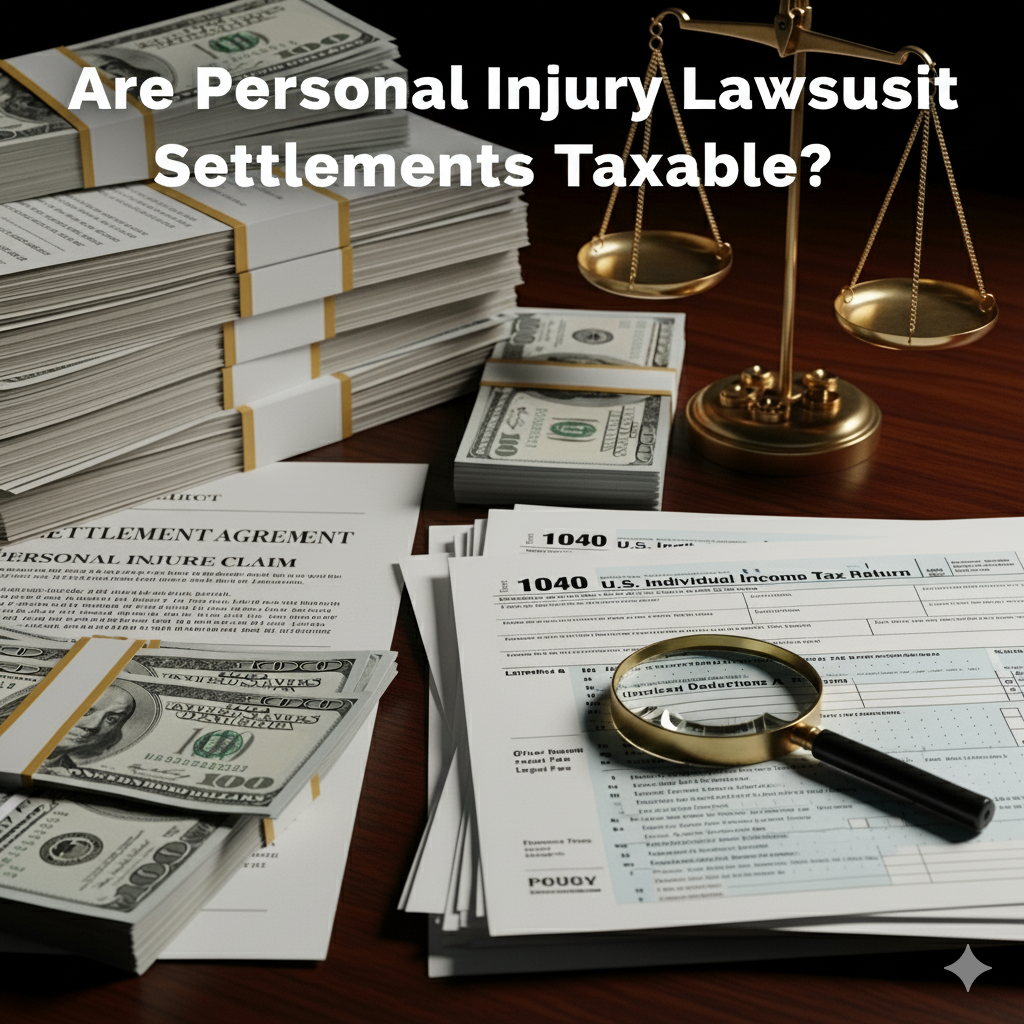Learn whether personal injury lawsuit settlements are taxable and what the IRS considers taxable income in injury claims.
So you’ve settled your personal injury case. Maybe you’re finally seeing light at the end of what’s been a long, stressful tunnel. But now there’s this nagging question keeping you up at night: Are personal injury lawsuit settlements taxable? Am I going to get hit with a massive tax bill on this settlement?
You’re not alone in wondering about this. It’s one of the most common questions people have after reaching a settlement, and honestly, it makes perfect sense to be concerned. The last thing anyone wants is a surprise visit from the IRS after they’ve already been through enough.
Here’s the thing though – the answer isn’t as straightforward as you might hope. Some parts of your settlement are tax-free, while others… well, not so much. Let’s break this down in a way that actually makes sense.
The Bottom Line Up Front
Most personal injury settlements are largely tax-free, but there are some important exceptions. The key is understanding what each part of your settlement actually covers.
Think of it this way: if the money is compensating you for physical injuries you suffered, it’s probably not taxable. If it’s replacing income you would have earned (and paid taxes on), or if it’s meant to punish the other party rather than compensate you, then you’ll likely owe taxes on it.
What the IRS Actually Says About Personal Injury Lawsuit Settlements
The IRS has a rule called Internal Revenue Code Section 104 that governs if personal injury lawsuit settlements are taxable. In plain English, it says that money you receive for “personal physical injuries or physical sickness” doesn’t count as taxable income.
This covers a lot of ground, including:
- Medical expenses – All those hospital bills, doctor visits, prescriptions, and physical therapy sessions? The money covering those costs isn’t taxable.
- Pain and suffering – This includes compensation for physical pain, emotional distress that stems directly from your physical injuries, and the overall impact on your quality of life.
- Other injury-related damages – Things like loss of consortium (the fancy legal term for how your injuries affected your relationship with your spouse) typically aren’t taxable either.
- The magic words here are “personal physical injuries.” If your settlement is directly connected to physical harm you suffered, you’re generally in the clear tax-wise.
The Parts You Don’t Have to Worry About
Let’s talk about what’s definitely not going to trigger a tax bill:
Your Medical Bills and Recovery Costs
This one’s pretty straightforward. Whether it’s the ambulance ride, surgery, ongoing therapy, or future medical care you’ll need – none of that compensation is taxable. The IRS recognizes that this money is just making you whole, not making you richer.
There’s one gotcha though: if you previously deducted medical expenses on your tax return and then later received settlement money for those same expenses, you might owe taxes on that portion. It’s the IRS’s way of preventing you from getting a tax benefit twice for the same expense.
Pain and Suffering (When It’s Connected to Physical Injury)
Here’s where it gets a bit more nuanced. If your emotional distress, anxiety, or depression stems directly from your physical injuries, the compensation for that suffering isn’t taxable.
For example, if you developed PTSD after a car accident that left you with permanent injuries, the settlement money for that psychological impact wouldn’t be taxed. The key is that emotional connection to the physical harm.
But – and this is important – if your case is purely about emotional distress with no physical injury involved (like a harassment case), then you’re probably looking at taxable income.
The Parts That Will Cost You at Tax Time
Now for the not-so-great news. There are several components of settlements that the IRS definitely wants their cut making personal injury lawsuit settlements taxable:
Punitive Damages
This is probably the biggest surprise for most people. Punitive damages aren’t meant to compensate you for what you lost – they’re meant to punish the other party for being especially reckless or malicious.
Since these damages aren’t compensation for your physical injuries, they’re almost always taxable. It doesn’t matter that they came from a personal injury case; the IRS sees them as income and wants their share.
The only exception is in certain wrongful death cases where state law only allows punitive damages and nothing else. But this is incredibly rare and you’d definitely need a tax professional to navigate it.
Lost Wages and Income
This one catches people off guard all the time. You’d think that since you lost this money because of your injuries, it wouldn’t be taxable. But the IRS looks at it differently.
Their logic is simple: if you had earned that income normally, you would have paid taxes on it. The settlement is just replacing that taxable income, so they’re going to treat it the same way.
This applies to:
- Wages you couldn’t earn while recovering
- Business income or profits you lost
- Future earning capacity that was diminished
- Interest on Your Settlement
- Sometimes there’s a long delay between filing your lawsuit and actually getting paid. Courts might award interest to account for this delay, and guess what? That interest is taxable income, just like interest from a bank account.
You’ll usually get a Form 1099-INT for this, and you’ll need to report it on your tax return.
- Sometimes there’s a long delay between filing your lawsuit and actually getting paid. Courts might award interest to account for this delay, and guess what? That interest is taxable income, just like interest from a bank account.
- Attorney Fees (Sometimes)The rules around attorney fees can get complicated, but here’s the general idea: if the settlement money going to your attorney is from a non-taxable portion of your settlement, then you don’t pay taxes on it. But if it’s coming from a taxable portion (like those lost wages we talked about), then it might be considered taxable income to you.
This is one of those areas where you really need professional help to get it right.
How You Get Paid Matters Too
The structure of your settlement can impact your tax situation:
Lump sum payments are straightforward – you get all the money at once, and the tax rules apply as we’ve discussed.
Structured settlements spread your payments over time. While this doesn’t change whether money is taxable or not, it can help manage the tax impact of any taxable portions by spreading that income over multiple years instead of taking a big hit all at once.
Don’t Ignore Those Tax Forms
Here’s something important: you might get a Form 1099-MISC or 1099-NEC even if most or all of your settlement isn’t taxable. Don’t just throw it in a drawer and forget about it.
You still need to report the settlement on your tax return and then explain to the IRS why it’s not taxable income. Ignoring the form is a great way to trigger an audit or get a bill for taxes you don’t actually owe.
Why You Need Professional Help
Look, I get it – you’ve already spent a fortune on lawyers and medical bills. The last thing you want is more professional fees. But trying to navigate settlement taxes on your own is like performing surgery on yourself because you don’t want to pay the doctor.
A good personal injury attorney who understands tax implications can:
- Structure your settlement agreement to minimize taxable components
- Work with tax professionals to plan for any tax consequences
- Help you properly report everything to the IRS
And honestly, the money you save by getting this right will probably more than pay for the professional advice.
The Reality Check
While a lot of personal injury settlements are largely tax-free, assuming your entire settlement is exempt is risky business. Those punitive damages, lost wages, and interest components can add up to a significant tax bill if you’re not prepared for it.
The smart move? Get professional guidance from both a knowledgeable personal injury attorney and a tax professional before you agree to any settlement structure. They can help you understand exactly what you’ll owe and plan accordingly.
Your settlement is supposed to help you move forward with your life, not create new financial stress. A little planning upfront can save you a lot of headaches later.
If you’ve been injured and are pursuing a settlement, contact Wood Injury Law to speak with a knowledgeable personal injury lawyer in Mesa, Arizona, who can guide you through the process and help protect your interests.




